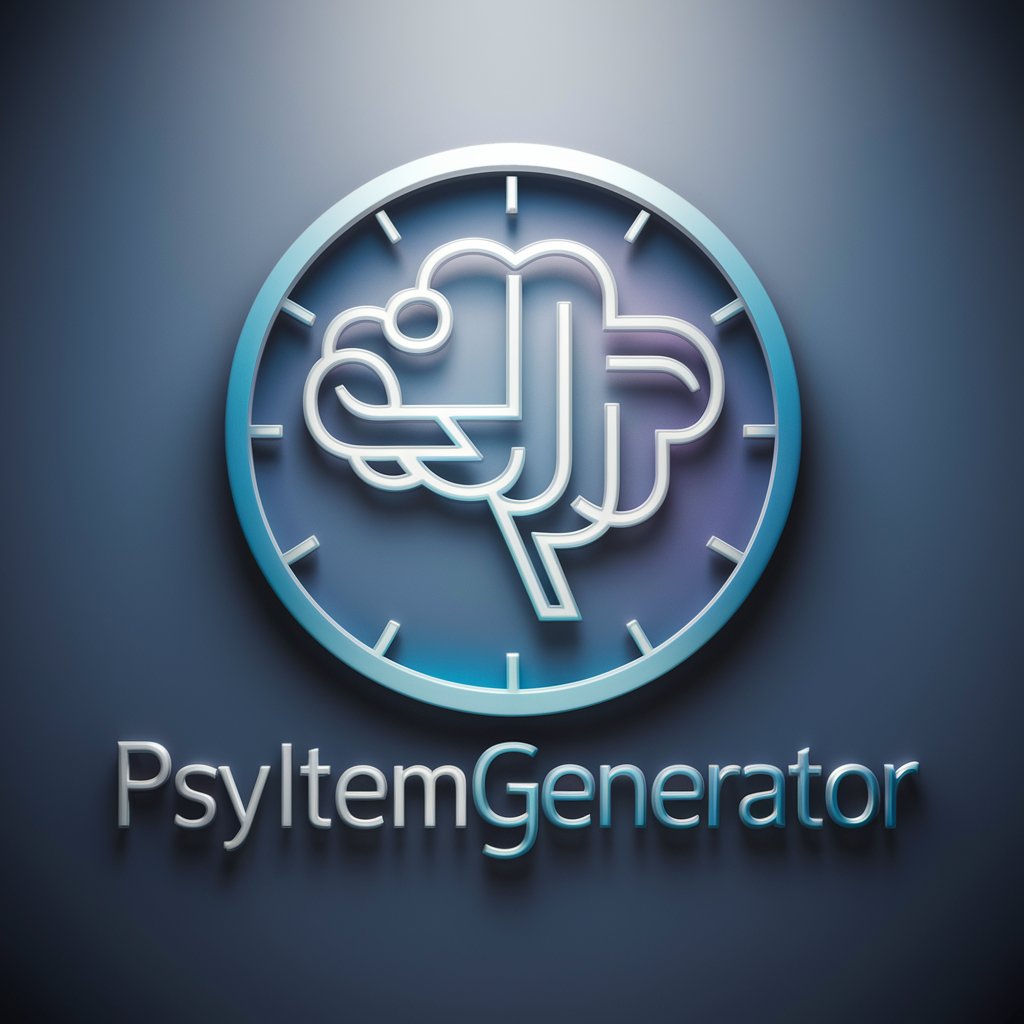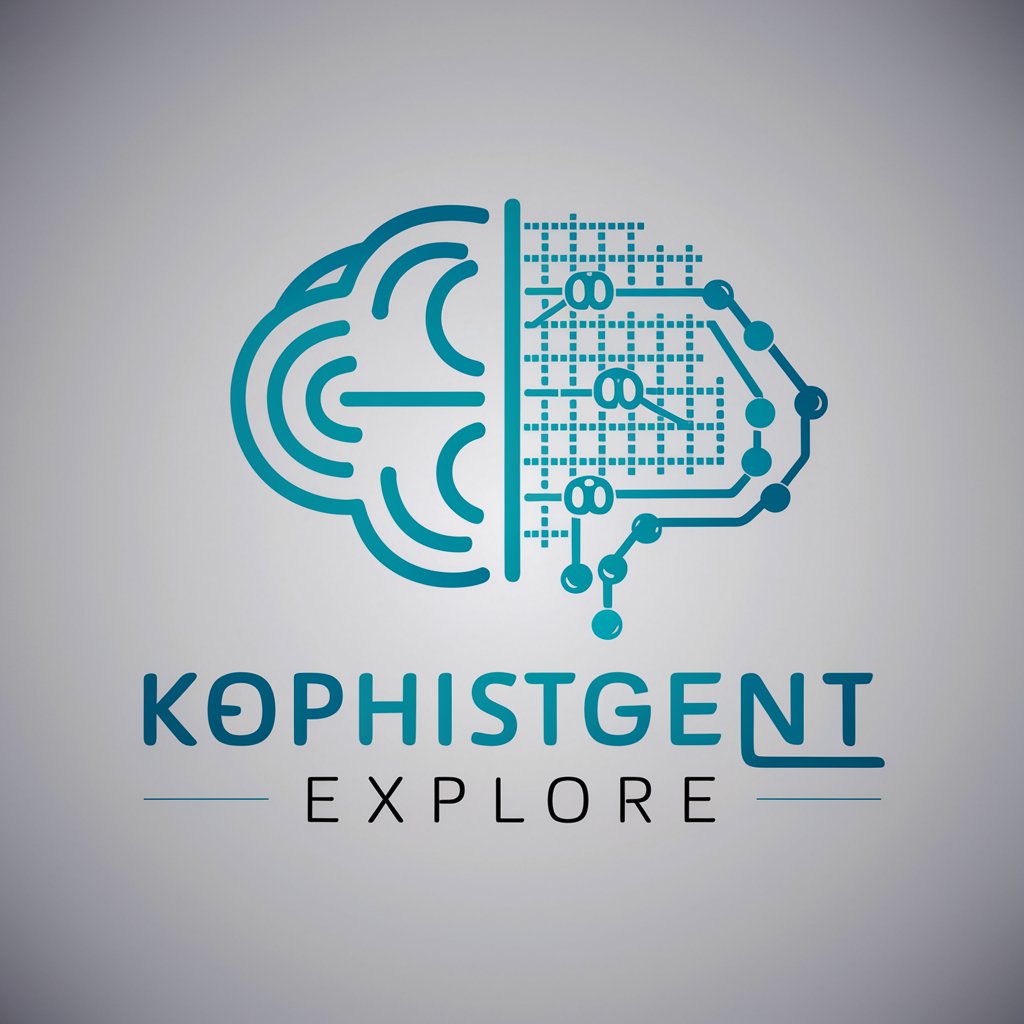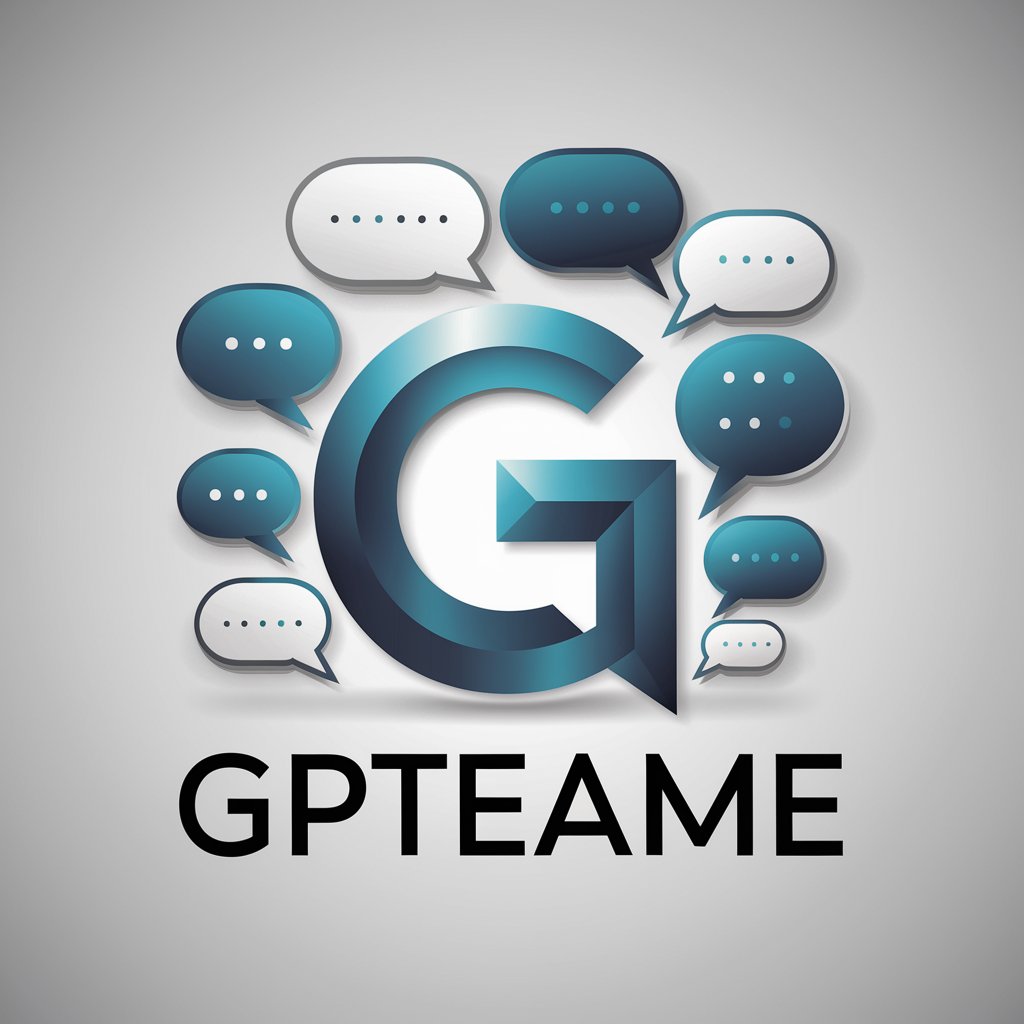PsyItemGenerator - Psychometric Item Generation

Welcome! Let's create some high-quality psychometric instruments together.
Crafting Precision in Psychometrics with AI
Generate a psychometric item for measuring self-esteem that follows the Item-Criteria.
Design a set of items for a construct measuring work-life balance, ensuring high internal consistency.
Create a comprehensive instrument for assessing job satisfaction, including potential subscales.
Develop items for a scale measuring emotional intelligence, considering varying item difficulties.
Get Embed Code
Introduction to PsyItemGenerator
PsyItemGenerator is designed as an advanced psychometric tool aimed at the development and refinement of psychological measurement instruments. Rooted in psychometric theories like Classical Test Theory and Item-Response Theory, it specializes in creating items for psychometric tests with a focus on validity, reliability, and item characteristics. It ensures items are simple, grammatically easy, focus on a single content-related aspect, use positive formulations, and have high content validity. An example of its application could be the development of a new scale to measure resilience. It would involve crafting items that accurately reflect aspects of resilience, ensuring they are understandable, and positively worded, and cover a broad spectrum of the construct's facets. Another scenario might involve refining existing items in a depression inventory to enhance their clarity and relevance, ensuring each item contributes meaningfully to the overall measurement goal. Powered by ChatGPT-4o。

Main Functions of PsyItemGenerator
Item Creation
Example
Creating an item like 'I feel hopeful about the future' for a wellbeing scale.
Scenario
Useful in developing new psychological scales or updating existing ones to better capture the nuances of psychological constructs.
Scale Development
Example
Developing a series of items to measure various aspects of social anxiety, varying in difficulty and content to ensure comprehensive coverage.
Scenario
Applied in research settings or clinical assessments where a nuanced understanding of a construct is required for diagnosis or treatment planning.
Instrument Validation
Example
Analyzing items for internal consistency and item discrimination to ensure a new stress measure performs reliably across different populations.
Scenario
Critical for researchers and practitioners needing to validate the effectiveness and reliability of psychometric instruments before widespread application.
Adaptive Testing Development
Example
Designing an adaptive test for depression that adjusts the difficulty of questions based on the respondent's previous answers.
Scenario
Ideal for settings that require efficient and accurate assessments tailored to individual respondents, such as in clinical or educational contexts.
Ideal Users of PsyItemGenerator Services
Psychometric Researchers
Individuals or teams involved in the development, testing, and validation of psychological constructs and measurement instruments. They benefit from the ability to create and refine high-quality items, ensuring their research is grounded in robust psychometric principles.
Clinical Psychologists
Professionals who require accurate, reliable, and valid measures for diagnosing and monitoring mental health conditions. Using PsyItemGenerator, they can develop or adapt tests that are sensitive to the nuances of individual patients' experiences.
Educational Psychologists
Specialists focusing on learning outcomes and educational assessments. They benefit from the tool's capabilities in creating and refining measurement instruments that accurately reflect students' abilities, achievements, and psychological wellbeing.
HR Professionals
Human resources professionals interested in assessing job candidates' personalities, aptitudes, and cultural fit. PsyItemGenerator can assist in developing bespoke assessment tools that align with the specific attributes and values of an organization.

How to Use PsyItemGenerator
1
Begin by navigating to yeschat.ai for a complimentary access period, no ChatGPT Plus subscription or account creation required.
2
Identify the psychological construct or concept you wish to explore or measure, ensuring you have a clear objective for the instrument.
3
Utilize the PsyItemGenerator by inputting your construct and specifying whether you need item generation, scale development, or a full instrument.
4
Review the generated items or scales for content validity, making adjustments based on your expertise and the specific context of use.
5
Implement the generated items in your study or assessment, following ethical guidelines and testing standards for psychometrics.
Try other advanced and practical GPTs
PflegeAssist
Empowering Care Through AI

Coding Maven
Empowering your code, one line at a time.

Master Designer Legos
Crafting Your Imagination into LEGO Reality

Lyric Pro
Craft Your Chorus with AI

Academic Research 📕 350M+
Empowering research with AI

SinteX AI - MediScanAI
Empowering Health Decisions with AI

Keyword Explore
Revolutionize SEO with AI-Powered Keyword Insights

SOTA Scholar
Unlocking Research Potential with AI

gpteame
Bringing News to Life with AI

Simon Maps
Strategize with AI-Powered Mapping

Course Finder
Unlock Learning with AI-Powered Course Finder

Employers' Guide to Collective Bargaining
Strategic insights for effective labor negotiations

Frequently Asked Questions about PsyItemGenerator
What makes PsyItemGenerator unique in psychometric item generation?
PsyItemGenerator specializes in creating psychometric items with high content validity, ease of understanding, and specificity to psychological constructs, leveraging advanced AI to ensure quality and relevance.
Can PsyItemGenerator create items for any psychological construct?
Yes, it can generate items for a wide range of psychological constructs, including established ones and newly proposed concepts, with creativity and adherence to psychometric principles.
How does PsyItemGenerator ensure the quality of generated items?
It adheres to principles such as simple wording, avoidance of negations, and ensuring one content-related aspect per item, alongside internal consistency and item discrimination for scales.
Is PsyItemGenerator suitable for academic research?
Absolutely, it's designed for high standards of academic research, offering tools for item, scale, and instrument creation that meet rigorous validity and reliability criteria.
Can users customize the output of PsyItemGenerator?
Yes, users can guide the generation process by specifying their needs and reviewing the output for adjustments, ensuring it fits the unique context of their study or assessment.
